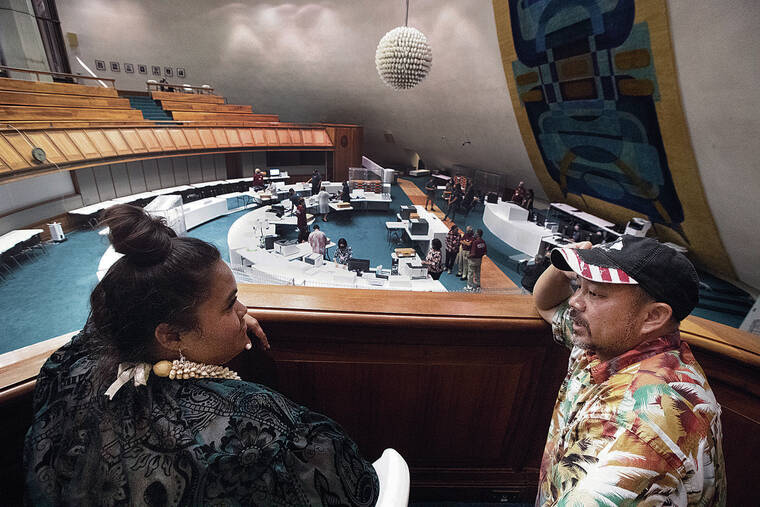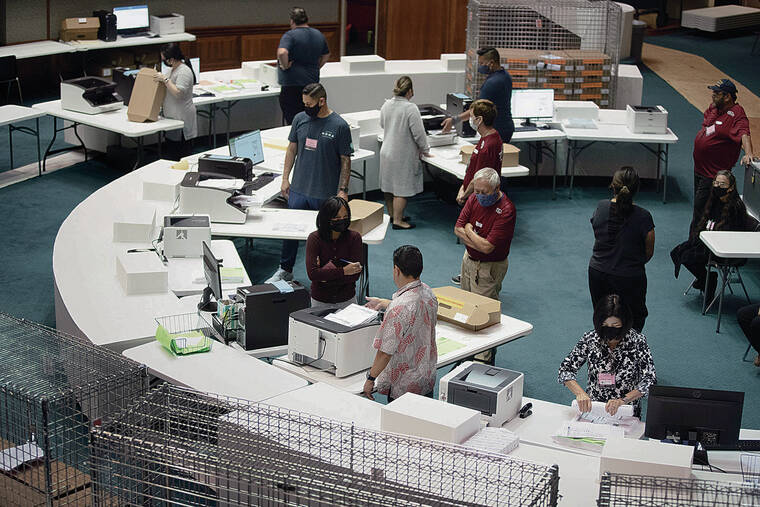A half-dozen races for elected office in Hawaii’s primary election on Saturday ended up being squeakers triggering automatic recounts.
Results from five contests for seats in the state Legislature and one for Kauai County Council qualified
for the mandatory double-
checking by the state Office of Elections because the difference in votes received by competing candidates was fewer than 100 or within 0.25% of votes cast.
The recounting, which began Monday, is a relatively new part of Hawaii elections established three years ago via state law.
Of the six close contests, the closest was among Republican candidates for House District 45, covering Waianae and Makaha, where only eight votes separated Tiana Wilbur, who received 410 votes, from Cherie
Oquendo, who received 402 votes. Even third-place finisher Maysana Aldeguer was only 57 votes behind the winner based on initial complete results released Sunday evening.
Wilbur said it was exciting on Saturday night to see early results from the race come in, and now there is added suspense.
“It was nail-biting,” she said, explaining that her lead was only four votes after an initial count of what was estimated to be around 90% of all ballots Saturday evening. Upon a final count released Sunday evening, her lead
extended a bit to eight votes.
On Monday morning Wilbur, Oquendo and Aldeguer all went to the state Capitol to witness the recounting, and Wilbur said she was prepared to stay overnight if necessary to see the process completed.
“This journey has just been phenomenal,” she said.
In the Democratic primary for House District 35, representing a portion of Pearl City and Waipahu along with Crestview, nine votes separated contenders Cory Chun and Nathan Takeuchi. Chun received 1,175 votes to Takeuchi’s 1,166 votes in this race where incumbent Rep. Roy Takumi found himself in a neighboring district because of reapportionment of district boundaries this year.
Another close race occurred in the Republican primary for House District 11, covering parts of Maui that include Kihei and Wailea. In this race, Shekinah Cantere received 678 votes, or 21 more than the 657 votes for Netra Halperin.
There were two other Republican primary races for legislative seats that met the automatic-recount criteria.
One was in Senate District 24, covering parts of Kailua and Kaneohe, where Antionette Fernandez topped Adriel Lam by 42 votes, 1,510-1,468. The other was in House District 20, covering Kahala along with parts of Kaimuki and Kapahulu, where Jessica “Priya” Caiazzo topped Consuelo “Liz” Anderson by 86 votes, 491-405.
The vote count difference between two candidates seeking seats on the Kauai County Council was more than 100 but fell within the 0.25% threshold to trigger a recount.
In this race the top 14 candidates with the most votes proceed to the general election, where seven winners will take office. The close call is for the cutoff spot, where 14th-place finisher Roy Saito received 1,394 votes, representing 1.1% of the total, to edge out Jakki Nelson, who received 1,261 votes, representing 1.0% of the total.
Hawaii has had an election recount requirement since 2019 when state lawmakers passed a bill to set up such a mechanism in the wake of a close 2018 general election contest for a state Senate seat won by now-Sen. Kurt Fevella (R, Ewa Beach-Iroquois Point) over now-Rep. Matt LoPresti (D, Ewa Villages-Ocean Pointe-Ewa Beach) by 116 votes, which represented a 0.9% difference.
In 2019 when the bill was being considered, the League of Women Voters of Hawaii said such a requirement would bring Hawaii in line with 43 states that already permit some form of recount, including 20 states with a similar procedure to what was proposed for Hawaii.
“All citizens need to be confident that in close elections there has been a fair examination of counting and other procedures,” the League said in written testimony at the time.
Under the recount law, the Office of Elections has 72 hours from the close of voting to produce the recount. To do this, officials pull all paper ballots in each qualifying contest and run them again through vote scanning and tabulation machines.
Nedielyn Bueno, spokesperson for the Office of
Elections, said officials are recounting ballots for the Oahu legislative seats at the state Capitol, while recounts for the two contests for a Maui House seat and Kauai County Council are being done at counting centers
on those islands.
The deadline to complete the recounting is today.
In Hawaii’s only previous primary election after the
recount law was enacted, results from three races were recounted, and no vote tallies changed enough to
reverse initial outcomes.
One of the close 2020 primary election results was for a House seat representing parts of Maui County, where an initial complete count showed incumbent Rep. Lynn DeCoite besting Democratic challenger Walter Ritte by 94 votes, 3,252-3,158. After the recount, DeCoite’s tally went down by eight votes while Ritte’s fell by seven.
Under Hawaii law, candidates as well as affected political parties and groups of at least 30 voters also can challenge results of an election by filing an objection with the Hawaii Supreme Court within set deadlines that vary among the primary election, general election and contests where automatic recounts are
triggered.





 Stay updated on Hawaii and national elections coverage
Stay updated on Hawaii and national elections coverage